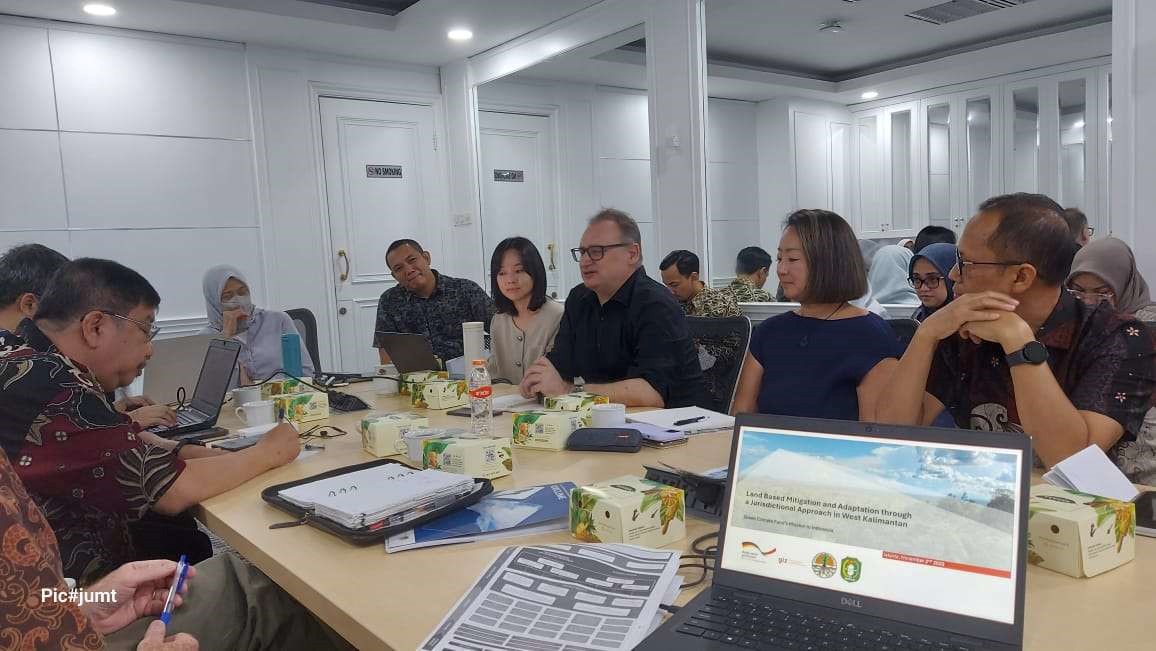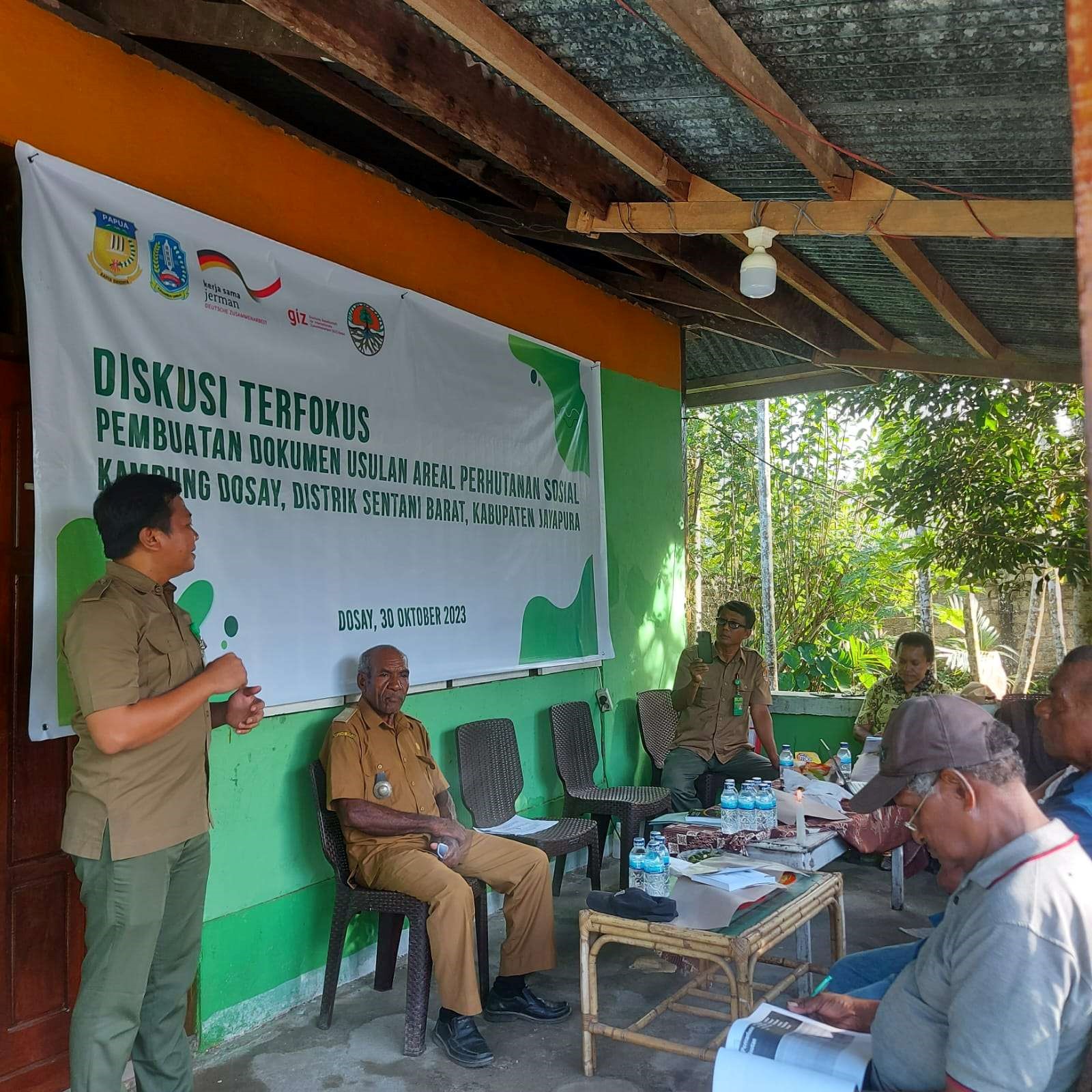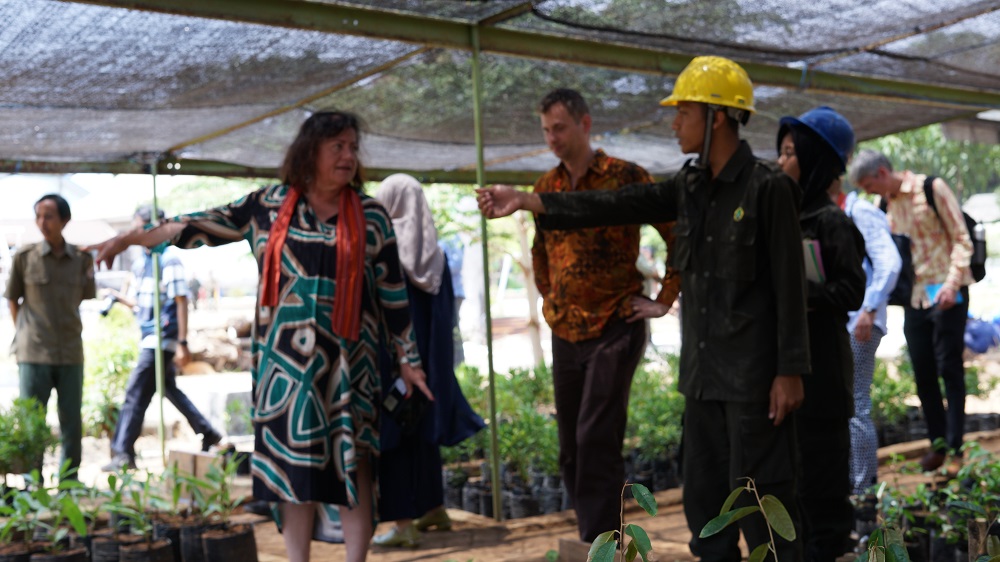FORCLIME
Forests and Climate Change ProgrammeTechnical Cooperation (TC Module)

Select your language

In an effort to engage in further coordination and communication regarding the West Kalimantan Province climate funding proposal from the GCF, GIZ is an accredited institution authorised to attend meetings of relevant parties at the national level, which include the Green Climate Fund (GCF) Secretariat, the Fiscal Policy Agency, as the National Designated Authority (NDA) that functions as the main liaison with GCF, the Ministry of Environment and Forestry (MoEF), the Environmental Fund Management Agency (BPDLH) and the West Kalimantan Province Environment and Forestry Service.
The most recent meeting, which was held on 2 November 2023 at the MoEF office in the Manggala Wanabakti Building, Jakarta, began with a few words from the Head of the Planning Bureau, Dr Apik Karyana. This was then followed by a presentation that was made by West Kalimantan Province in conjunction with GIZ and that addressed a series of activities relating to the development of climate funding proposals, as well as management and monitoring programmes.
During the meeting, the progress of the proposal that has been prepared by the West Kalimantan Provincial Government, as supported by GIZ, was discussed. While discussions were also aiming to ensure that the prepared project plan was in line with and a part of Indonesia's work programmes.
"This meeting with the GCF Secretariat represents an important milestone in the journey of the West Kalimantan GCF project. The presence of the GCF Secretariat, NDA, KLHK, BPDLH and GIZ, alongside West Kalimantan Province, demonstrates the ongoing commitment and support of the parties for this GCF project," explained Prof. Gusti Hardiansyah, a lecturer from Tanjungpura University and one of the members of the West Kalimantan Province REDD+ Working Group.
Next will come the planned submission of the GCF climate funding proposal to the Ministry of Environment and Forestry in order to secure a project recommendation. This proposal will then be forwarded to the Fiscal Policy Agency as GCF Indonesia NDA in order to secure a No Objection Letter (NOL) before the proposal is finally submitted to the GCF Secretariat.
For more information, please contact:
Jumtani, Advisor for Sustainable Forest Management and Value Chains, GCF Focal Point
Wandojo Siswanto, Strategic Area Manager for Forest Policy and Climate Change

The Social Forestry and Environmental Partnership Center (BPSKL) Maluku Papua engaged in an outreach effort last July in relation to its social forestry programme, particularly within the area of Dosay Village, Jayapura Regency, Papua Province. This activity was implemented in conjunction with the Papua Forest Resources Conservation Center (BBKSDA) as a part of efforts aimed at accelerating social forestry management access within the province. During the event, the community of Dosay Village was provided with information on the five social forestry schemes that can be selected from and applied to the management of their forests. In this regard, the village forest and the community forest schemes are the two such schemes which have been deemed the most suitable for the population of Dosay.
Following up on this previous outreach event, FORCLIME, in conjunction with the Region III Section of BPSKL Maluku Papua, held an FGD with the people of Dosay Village on 30 October 2023 in order to discuss the initial concept of the Village Forest Management Agreement (PPHD) document, including various elements that still need to be finalized by the community through consensual processes. The event was opened by the Head of Dosay Village, Mr. Yunus Yoboisembut, and was attended by tribal heads from the village. The FDG results document was subsequently distributed to the tribal heads present at the meeting and will be used during further clan-level discussions that will be held in order to decide on the size of the proposed management area in accordance with the selected social forestry scheme.
“This social forestry activity has been highly valuable and the regulation explains exactly how tribes/clans can manage their lands,” explained Mr. Martinus Done, a community leader from Dosay Village. “The community hopes that information regarding the relevant area boundaries will be immediately disseminated so that the population will be able to manage their land and receive the benefits from their forests,” Mr. Done concluded.
After the documents have been completed by each clan, the application document for the Dosay Village social forestry programme will be finalized by the Dosay Village government through the publication of an official report on the approval of the village forest scheme by the Dosay Village community. This report will then be submitted in the form of a Village Forest Management Approval (PPHD) document.
For more information, please contact:
Hana Soakakone, intern from Cenderawasih University
Yosina Demetouw, intern from Cenderawasih University
Rut M Ohoiwutun, Junior Adviser for Community Forestry and Hutan Adat, Papua
Mohammad Sidiq, Strategic Area Manager for Sustainable Forest Management and Coordinator for Papua and West Papua Provinces

FORCLIME 4.0 has been collaborating with the Makassar Environment and Forestry Training Center in the development of environmental and forestry human resources in Eastern Indonesia. Collaboration is also being carried out with the Makassar State Forestry Vocational School for vocational education. The German Federal Ministry for Economic Cooperation and Development (BMZ) has been paying close attention to this collaboration, which was realized through a visit to the Makassar State Forestry Vocational School that took place on 23 October 2023. The visit was one of several planned activities of the BMZ Delegation during its visit to Indonesia, which took place between 21 and 27 October 2023. The BMZ delegation, which was led by BMZ Parliamentary State Secretary, Ms Baerbel Kofler, was received by the Head of the Foreign Cooperation Bureau of the Ministry of Environment and Forestry, Mr Dida Migfar Ridha.
Several topics were discussed during the visit, including: (1) Efforts to develop environment and forestry human resources that are being undertaken at the Makassar Environment and Forestry Training Center (2) Vocational education efforts that are being organized by the Makassar State Forestry Vocational School; (3) Strategic issues related to community-based forest management.
The BMZ delegation also held a dialogue with students and visited facilities at the Makassar State Forestry Vocational School, including a tissue culture laboratory, forest plant nursery, bee cultivation facility and waste bank.
During the visit, Ms Kofler stated that she had been highly impressed by her visit and expressed the hope that the students who are set to become the nation's next generation of leaders and professionals will continue to study intensively in order to develop their professionalism as regards the conservation of forests within Indonesia.
After concluding the visit to Makassar, the BMZ Delegation continued to the GIZ working area in the Lore Lindu Biosphere Reserve in Central Sulawesi.
For more information, please contact:
Edy Marbyanto, Strategic Area Manager for Human Capacity Development
 |
Supported By: |
  |